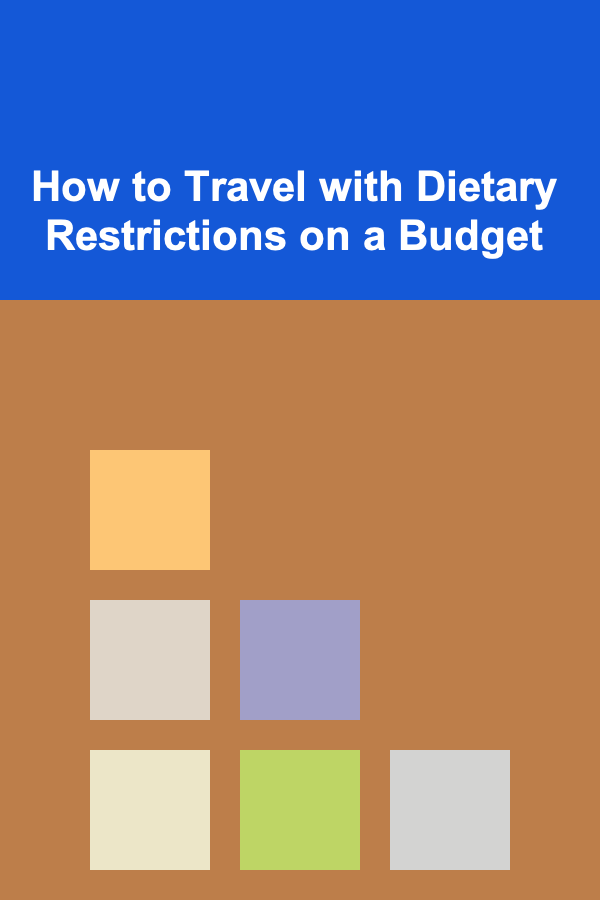
How to Travel with Dietary Restrictions on a Budget
ebook include PDF & Audio bundle (Micro Guide)
$12.99$6.99
Limited Time Offer! Order within the next:

Traveling is one of life's most enriching experiences. It opens doors to new cultures, cuisines, and landscapes, allowing people to broaden their horizons and create unforgettable memories. However, for travelers with dietary restrictions, whether due to health, religious beliefs, or personal preferences, the journey can sometimes seem more daunting than exciting. Finding suitable meals while staying within a budget can be a complex task. Yet, with the right approach and planning, it is absolutely possible to enjoy a fulfilling travel experience without compromising dietary needs or breaking the bank.
In this article, we'll explore strategies and tips for traveling with dietary restrictions on a budget. We will discuss how to plan ahead, find suitable food options, and even prepare your own meals while traveling---all without spending too much money.
Understand Your Dietary Needs
Before diving into the specifics of how to travel with dietary restrictions, it's essential to have a clear understanding of your personal needs. Dietary restrictions can vary widely, from vegetarianism, veganism, and gluten intolerance to more specific conditions like lactose intolerance, celiac disease, and food allergies. Knowing exactly what foods you can and cannot consume will be crucial in making informed decisions about what to eat while traveling.
Tips for Understanding Dietary Needs
- Consult a Doctor or Dietitian: If your dietary restrictions stem from medical conditions like food allergies or intolerances, it's important to get professional advice on how to manage your diet during travel.
- Know Your Alternatives: Whether it's gluten-free bread or dairy-free alternatives, knowing what substitutes are available can help you make informed decisions when shopping or dining out.
Research Your Destination
One of the first things you should do when planning a trip with dietary restrictions is to thoroughly research your destination. Different countries and regions have different food cultures, which can significantly impact the availability of suitable food. While some places are more accommodating to dietary restrictions, others may have fewer options.
What to Research
- Local Cuisine: Look up traditional dishes in your destination to understand the typical ingredients used. This will help you identify potential problem foods and safe alternatives.
- Grocery Stores and Markets: Research local grocery stores or markets to find out if they carry products that meet your dietary needs.
- Restaurants and Cafes: Many cities now have restaurants that cater to specific dietary needs. Check online reviews or apps like HappyCow (for vegans and vegetarians) or find gluten-free restaurants via dedicated websites.
- Language Barriers: If you're traveling to a country where you don't speak the language, it's a good idea to learn some key food-related phrases. For example, if you're vegan, you can learn how to ask if a dish contains animal products in the local language.
Budget-Friendly Food Choices When Traveling
While it may seem like eating with dietary restrictions on a budget is impossible, there are plenty of cost-effective food options available, even when you need to stick to specific diets.
Street Food
In many parts of the world, street food can be an affordable and exciting way to sample local cuisine. While it's often known for being cheaper than restaurant dining, it can also provide a variety of options that fit your dietary needs. For example, in Southeast Asia, you may find vegan spring rolls or gluten-free rice dishes that are both inexpensive and delicious.
Tips for Street Food
- Know What to Look For: Research common street foods in your destination that align with your dietary restrictions. For instance, if you're vegetarian or vegan, there might be plant-based dishes that you can easily spot.
- Ask the Vendor: Don't hesitate to ask vendors about ingredients or how food is prepared. Many street food vendors are more than willing to accommodate specific dietary needs if you communicate clearly.
- Avoid Pre-Packaged Items: Whenever possible, opt for freshly prepared street food, as pre-packaged items often contain hidden ingredients that may not fit within your dietary restrictions.
Cooking Your Own Meals
When traveling on a budget, preparing your own meals is one of the best ways to stay within your dietary restrictions without overspending. Many hostels, Airbnb properties, and guesthouses come equipped with basic kitchen facilities, allowing you to cook your own meals.
Tips for Cooking on a Budget
- Plan Your Meals: Before your trip, make a list of easy-to-prepare meals that fit your dietary needs. Simple options like pasta with tomato sauce, rice and beans, or stir-fried vegetables are budget-friendly and can be adapted to suit many dietary restrictions.
- Buy Local Ingredients: Focus on buying local fruits, vegetables, grains, and legumes that are often cheaper than pre-packaged or imported goods. Not only are these foods more affordable, but they often offer the freshest flavors.
- Use Minimal Equipment: When cooking on the go, invest in a small portable stove, kettle, or other lightweight equipment that can make cooking easier and more convenient without taking up too much space in your luggage.
Supermarket Shopping
If you're staying in an accommodation with a full kitchen, shopping at local grocery stores is an excellent way to save money while sticking to your dietary restrictions. Many supermarkets now offer dedicated gluten-free, dairy-free, and organic sections, so finding suitable food may be easier than you think.
Tips for Supermarket Shopping
- Know What You Need: Before shopping, make a list of essential ingredients that meet your dietary needs. Look for staple items like rice, lentils, quinoa, and canned vegetables that can be used to make simple, nutritious meals.
- Local Markets: In many countries, local farmers' markets offer fresh produce at a fraction of the price you would pay at a grocery store. Plus, you can ask farmers directly about how their produce is grown, ensuring it fits your dietary needs.
- Be Aware of Local Brands: Many local brands offer affordable products that cater to dietary needs, such as gluten-free pasta or dairy-free alternatives. Make sure to read labels carefully to check for hidden ingredients.
Pack Your Own Snacks
One of the biggest challenges when traveling with dietary restrictions is finding suitable snacks while on the go. Airports, bus stations, and tourist attractions often offer limited food options, and many of them may not cater to your specific dietary needs. Packing your own snacks can help ensure you have something to eat when hunger strikes.
Ideas for Travel-Friendly Snacks
- Granola Bars: Make your own or buy pre-packaged bars that are dairy-free, gluten-free, or vegan. Granola bars are easy to carry and can be a quick source of energy.
- Nuts and Seeds: A small bag of mixed nuts or seeds is a great way to get protein and healthy fats while traveling. Just be cautious if you have a nut allergy, and opt for alternatives like sunflower seeds.
- Fruit: Fresh fruit like apples, bananas, or oranges are easy to pack and don't require refrigeration. Dried fruits can also be an excellent portable snack.
- Rice Cakes or Crackers: Many gluten-free rice cakes or crackers can be found in supermarkets and are a good snack option for travelers with gluten intolerance.
Use Technology to Your Advantage
Thanks to modern technology, finding suitable food while traveling with dietary restrictions has never been easier. There are numerous apps, websites, and online resources designed to help travelers navigate food options in various destinations.
Apps and Websites to Use
- HappyCow: This app helps you find vegan, vegetarian, and plant-based restaurants around the world. It also includes user reviews and tips about specific dietary needs.
- Gluten-Free Roads: This app is designed for gluten-free travelers and helps you find restaurants, hotels, and supermarkets that cater to gluten-free diets.
- Google Translate: If you're traveling to a country where you don't speak the language, Google Translate can help you understand restaurant menus or explain your dietary needs to restaurant staff.
Manage Expectations and Stay Flexible
Lastly, it's important to manage your expectations and be flexible with your dietary needs while traveling. While you may not always be able to find a perfect match for your dietary restrictions, with the right attitude and a little creativity, you can make the most of your trip.
Tips for Flexibility
- Embrace Local Alternatives: Sometimes, you may need to adapt your diet to local options. For example, if you're vegetarian in a country where meat is a staple, look for plant-based dishes that can be adapted to suit your needs.
- Communicate Clearly: Don't be afraid to communicate your dietary needs clearly to restaurant staff, even if there's a language barrier. A smile and patience can go a long way in ensuring you get a meal that fits your needs.
Conclusion
Traveling with dietary restrictions on a budget doesn't have to be an overwhelming or expensive experience. By planning ahead, researching your destination, cooking your own meals, and utilizing technology, you can navigate the challenges of traveling with dietary needs while keeping costs low. With the right mindset and preparation, you can enjoy your travels without compromising on your health, budget, or dietary preferences.

How to Declutter Your Mind through Home Organization
Read More
How to Invest in Stocks for Beginners
Read More
How to Make Money Online as a Construction Surveyor: 10 Actionable Ideas
Read More
Smart Strategies for Lowering Boat or RV Insurance Premiums Without Compromising Coverage
Read More
The Essential Step-by-Step Handbook
Read More
How to Edit Photos for Print vs. Digital
Read MoreOther Products

How to Declutter Your Mind through Home Organization
Read More
How to Invest in Stocks for Beginners
Read More
How to Make Money Online as a Construction Surveyor: 10 Actionable Ideas
Read More
Smart Strategies for Lowering Boat or RV Insurance Premiums Without Compromising Coverage
Read More
The Essential Step-by-Step Handbook
Read More